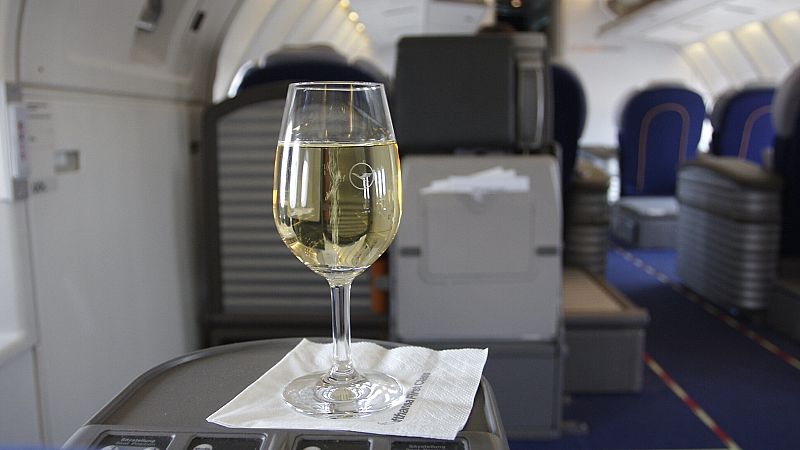Air Canada offers free booze in economy. Will it be comfort or chaos at 10,000 metres?

There’s good news for those who like a drink while flying. This week, Air Canada has announced that economy passengers on all flights, not just long-haul routes, will be served complimentary beer, wine and snacks starting this autumn.
That makes the Montreal-based carrier the only North American legacy airline to pour alcohol for free in economy cabins across its entire network.
US competitors such as American, Delta and United only serve drinks on flights beyond a certain mileage, while low-cost carriers such as Spirit, Frontier and JetBlue charge for alcoholic beverages.
Why is Air Canada offering free drinks now?
Scott O’Leary, Air Canada’s vice president of loyalty and product, said that the decision reflects how much in-flight conveniences matter to customers.
“Food and beverage tend to have a disproportionate impact on customer satisfaction,” he told Reuters, adding that waiving alcohol charges rather than lowering baggage fees has more value for passengers – and perhaps the airline as well.
The new menu also showcases Canadian favourites onboard the country’s flag carrier.
Morning flights include complimentary oat bars from Canadian brand MadeGood, while departures from Toronto’s Billy Bishop Airport will offer ginger wellness shots from local producer Greenhouse after 10:30 am.
The free beer change comes with another wrinkle. By serving Heineken 0.0 onboard, Air Canada will be the only North American airline to offer non-alcoholic beer at cruising altitude.
Altogether, the move is meant to leave passengers feeling better cared for – if not more loyal – at a time when onboard service has become a key differentiator between airlines.
Free drinks can also come with turbulence
Not everyone in the aviation industry is raising a glass.
Alcohol might be a source of comfort for some travellers, but it has also become a major flashpoint and source of disruptive behaviour in the air.
In 2017, the International Air Transport Association reported an uptick in unruly passenger behaviour, with one incident for every 1,053 flights worldwide. By 2023, the rate had spiked to one for every 480 flights. More than a quarter of those cases involved alcohol, often consumed before boarding.
Recent incidents highlight the challenge airlines face when it comes to alcohol.
In late September, a Ryanair flight from London Luton to Alicante was diverted after a group of intoxicated passengers became violent. Just weeks prior, an easyJet flight from Málaga was cancelled when a group of allegedly drunk passengers disrupted boarding procedures.
In the United States, the Federal Aviation Administration (FAA) logged over 2,100 unruly passenger reports in 2024. Dozens were referred for possible criminal prosecution.
What are airlines doing to curb alcohol-related problems?
Since 2021, the FAA’s Zero-Tolerance Policy has established civil penalties for violations such as consuming personal alcohol on a flight, including fines up to $37,000 (€31,500).
European airlines have taken varying approaches to the issue. Low-cost carrier Jet2 banned the sale of alcohol before 8 am, while earlier this year, Ryanair’s outspoken CEO Michael O’Leary suggested imposing a two-drink limit at airport bars.
Public support for such measures is surprisingly strong. A 2024 YouGov poll found that 62 per cent of Britons would back limits on pre-flight drinking.
But aligning public support with regulation has proven difficult. Airport bars across the UK can legally begin serving alcohol from 5 am, and proposals to curb early-morning sales have repeatedly stalled.
Striking a balance at 10,000 metres
Cabin crew are often the first to spot when holiday spirits have gone too far.
One flight attendant for a major global airline, speaking on the condition of anonymity, says she monitors passengers who order multiple drinks closely. “There are many valid reasons to limit alcohol consumption onboard, from safety issues in the event of an emergency to the well-being of other passengers,” she explains.
Some argue that cutting back alcohol service on planes may backfire, encouraging travellers to binge in terminals before boarding – a trend that may have peaked a few years ago. “Drunks are gonna drink,” one frequent flyer commented on Reddit, pointing out that incidents rose during the pandemic when airlines halted alcohol sales.
For airlines, the decision is a delicate one. Alcohol sales generate revenue and meet consumer expectations, but they also bring risks to safety, staff and other passengers.
Air Canada’s gamble is that free drinks, managed responsibly, will translate into happier travellers, a stronger brand and perhaps stronger sales, too.

